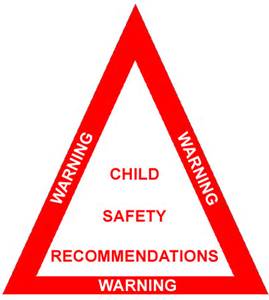Child Safety
www.lapdonline.org
Children are our most precious resource. Unfortunately, because of their vulnerability, children are popular targets for molesters, drug dealers, and other predatory criminals. As a result, parents have teamed up with the Los Angeles Police Department, the Los Angeles Unified School District, and other professionals to focus on child
crime prevention measures. By working with children and teaching them crime prevention measures, we can substantially reduce the chances of child victimization.
An important tool for teaching children personal security is reinforcing their trust in the adults who care for them, e.g., parents, police and teachers. To further lessen the chances of children becoming victims,
the following objectives should be stressed:
•Reassurance: Inform your children they can be safer if they form good habits and follow some simple rules. One good rule for children to remember is: never go anywhere with anyone without their parents’
permission;
•Openness: Encourage your children to confide in you, even if the subject feels uncomfortable;
•Strangers: Teach your children the difference between good strangers and bad strangers. Good strangers are police officers, teachers and firefighters. Children should seek assistance from them if they are in trouble. Children should avoid other strangers; and
• Secrets: Discourage your children from keeping bad secrets. A bad secret is when an adult tells a child to keep information from the child’s parents or guardian.
An example would be an adult offering a child candy to get into his or her car and then telling the child not to tell anyone.
Another example would be if an adult tries to touch the private body
parts of a child and then tells the child not to tell anyone. Private body parts are parts of the body covered by a bathing suit. Child molesters have also been known to approach children and fake a family
emergency. A good example would be a child molester who drives to a school bus stop and tells a child, “Your dad is hurt and your mom wants you to come with me to the hospital.” The chances are high that a child placed in this circumstance might be tempted to get into the car. That is why parents should select a family code word that they and their children know. If a stranger does not know the code word, the children will know not to trust him or her. A good secret is keeping a family code word confidential.
Children Should Know
• The definition of an emergency and when to contact police, fire or paramedics;
• Their full name, address, and telephone number, including area code;
• Their parents’ full name and work telephone number;
• How and when to use 911 and how to use a public telephone;
• How to use the telephone to call home;
• That they should check in with you or a trusted neighbor when he or she gets home from school so you always know where they are;
•Where to go for safety if you are not around;
•The location of Safe Houses in their neighborhood and the ability to recognize the Safe House Placards;
• Always keep doors locked, even during the day;
• Anyone they don’t know is a stranger;
• Stay away from cars occupied by strangers;
• Never open doors for strangers;
• Never tell anyone who comes to the door (or anyone who calls on the telephone) that they are alone;
• When answering the telephone, never give information to strange callers;
• It’s OK to say NO to an adult if the adult makes them feel uncomfortable or wants them to do something they feel is bad;
• Never let anyone touch them where their underwear or swimsuit should cover;
• It’s OK to run away and scream “HELP” if someone tries to make them do something they don’t want to do;
• It’s OK to tell if someone offers them gifts or money, or wants to photograph them;
• How to describe a person’s appearance, clothing and their car if they are ever approached by a stranger;
• Run to other people and to lighted areas if they are being followed;
• Stay near parents while in a store or other public place;
• Never go out to a parking lot if they get separated from parents in a shopping center or mall;
• Go to the nearest check out counter and ask a cashier or clerk for assistance if they get lost in a store;
• What to do if they should become lost in a crowd;
• Stay in one place if they get lost;
• Never go into a public restroom alone; and
• Never play in abandoned buildings.
Play crime prevention roles with your children and teach them how to respond. If properly prepared, your children will automatically take the correct crime prevention action in a dangerous situation. It is mportant to practice with your children and to encourage a “crime prevention attitude” in their daily lives
Address/Location
LAPD – Van Nuys
6240 Sylmar Ave
Los Angeles, CA 91401
Contact
Emergency: 9-1-1
